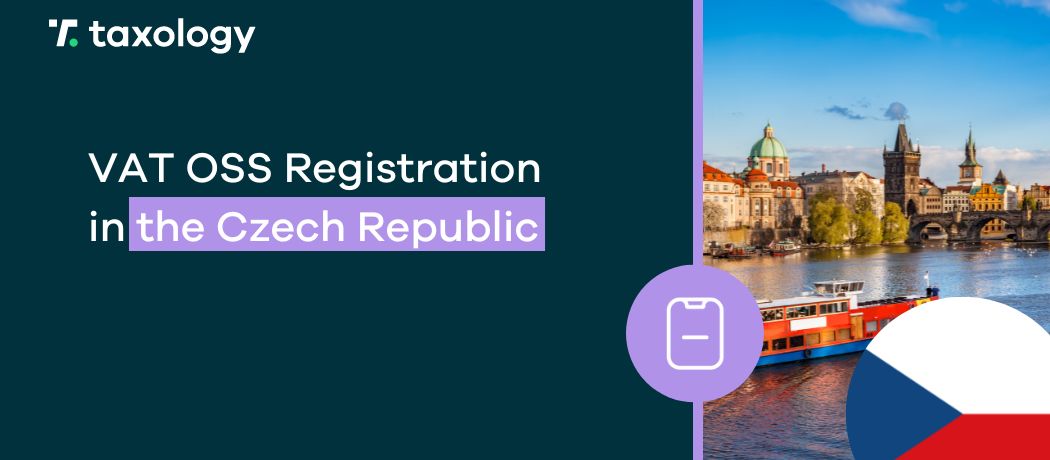Filing zero VAT returns is mandatory in many countries. This is particularly important for entrepreneurs in the e-commerce sector who hold foreign VAT numbers, as there may be months when […]
Read in: 4 minVAT OSS Registration in Czech Republic – Step by Step
Contents- VAT OSS and VAT in the Czech Republic
- When is VAT registration mandatory in the Czech Republic?
- Step 1: Application for VAT OSS Registration in the Czech Republic
- Step 2: Data entry
- Step 3: Access to the tax portal
- VAT OSS and obligations
- How to register for VAT OSS in the Czech Republic? - summary
- Last update: 12.04.2024
- Published: 29.11.2023
- Read in: 6 min
A constant element in the economic systems across all European Union countries is undoubtedly VAT, and the Czech Republic is no exception. However, like other member states, it has its own rules defining the procedures related to VAT. It also has its own regulations concerning registration for VAT OSS purposes in the Czech Republic, which we focus on in this article.
If you run a business based in the Czech Republic or outside the EU territory but are registered for VAT purposes in the Czech Republic, this article will provide you information about VAT in the Czech Republic and the aforementioned VAT OSS registration in this country. If your business headquarters are in Poland or another EU country, you should register for the VAT OSS procedure in your country of residence. We invite you to read further.
From this article, you will learn:
- What is VAT OSS?
- What are the VAT rates in the Czech Republic?
- When is VAT registration mandatory in the Czech Republic?
- How to register for VAT OSS in the Czech Republic?
- What obligations do VAT OSS taxpayers have in the Czech Republic?
VAT OSS and VAT in the Czech Republic
The standard VAT rate in the Czech Republic is 21%. Reduced rates in this country are 15% and 10%, and there is also a zero VAT rate. More on this topic can be read in our article — VAT Czech Republic 2024.
Entrepreneurs who conduct business within the Czech Republic or engage in distance selling to private customers from this country must consider the necessity of settling VAT in the Czech Republic. Two methods are available.
The first concerns local VAT settlements, requiring a local VAT registration in the Czech Republic. Alternatively, entrepreneurs can also settle VAT under the special EU VAT OSS (One Stop Shop) procedure.
Introduced on July 1, 2021, as part of the e-commerce package, VAT OSS expanded the existing MOSS (Mini One Stop Shop) procedure, which previously allowed for settling VAT in one declaration for providing electronic services to private, non-VAT-liable consumers from other EU countries.
However, VAT OSS expanded this tool to include VAT arising from the sale of goods and services B2C by entrepreneurs from the European Union and third countries.
VAT OSS Procedure for Non-EU Sellers
As mentioned earlier, under the VAT OSS procedure, entrepreneurs from third countries can also settle their distance sales to private customers from EU countries, and they can register for it in the country where they previously made a local VAT registration, for example, in the Czech Republic.
If you want to learn more about the VAT OSS procedure, check out our dedicated article – What is VAT-OSS?
When is VAT registration mandatory in the Czech Republic?
It’s also worth mentioning when entrepreneurs are obliged to register for VAT in the Czech Republic, and we add that a Czech VAT number is necessary for VAT OSS registration in this country. Nonetheless, obligations related to settling VAT and submitting declarations in the Czech Republic arise when:
- entrepreneurs conduct sales of goods and services on Czech territory,
- there are intra-community deliveries of goods and intra-community acquisitions of goods,
- exports of goods from the Czech Republic to third countries occur,
- imports of goods from third countries into Czech territory take place,
- entrepreneurs store goods on Czech territory,
- the limit for intra-community distance sales of goods (WSTO) is exceeded.
The last point refers to the sales limit of goods and services set at 10,000 Euros, established, like VAT OSS, on July 1, 2021, and applies to the total B2C sales by a company to consumers from other EU countries.
When this sales limit is exceeded, entrepreneurs are required to register for VAT in the consumer’s country, where they must settle their sales of goods and services, and use local VAT rates or register for VAT OSS, thus avoiding local registrations and settling all such sales through one, collective declaration.
However, it must be emphasized that the VAT OSS procedure does not apply to B2B sales and local sales.
Now let’s get to the essence, that is, how to register for VAT OSS in the Czech Republic.

Need help with VAT or e-commerce accounting?
Contact us and let us know what the problem is, and our specialists will take care of the rest! Regardless of whether it is about VAT Compliance – registrations, declarations and settlements of VAT, VAT OSS or VAT EU – or accounting in e-commerce!
Schedule a consultationStep 1: Application for VAT OSS Registration in the Czech Republic
The first step to initiate VAT OSS registration in the Czech Republic is to access the mojedane.cz platform and select the appropriate system:
- EU system — intended for entrepreneurs based in the Czech Republic or entrepreneurs from outside the EU territory but operating in the Czech Republic. Note that the subsequent steps in this article will describe the choice of the EU system.
- Import system — intended for entrepreneurs based in the Czech Republic or with a place of business in the Czech Republic if their headquarters are outside the EU territory, or for entrepreneurs with a place of business outside the EU but represented by an intermediary.
- Non-EU system — intended for entrepreneurs based or with a place of business outside the EU territory.
It’s important to note that before filing an application for VAT OSS coverage, one must have a Czech VAT number, which is obtained after local registration, more on which can be found in our article — VAT registration in the Czech Republic.
Authentication
When submitting the form for VAT OSS registration, the taxpayer must also authenticate themselves in one of three ways:
- with a verified identity of the applicant in a manner that allows logging into his data mailbox,
- using access with a guaranteed identity (e.g., NIA or eCitizen),
- via the tax information field (My Tax Portal – logging into DIS+).
Step 2: Data entry
After selecting the EU system and authenticating, the applicant will need to fill out a form including necessary details, such as:
- Czech VAT number,
- taxpayer’s email address,
- contact person’s details,
- client details, e.g., bank account number in IBAN format,
- date of commencement of using VAT OSS,
- details regarding VAT registration in other countries,
- information concerning the supply chain.
Once these details are filled in, the form can be sent for verification. If all necessary information has been correctly provided, the applicant will be covered by VAT OSS in the Czech Republic. However, this is not yet the final step to benefit from this procedure.
Step 3: Access to the tax portal
To use VAT OSS in the Czech Republic, one must also apply for access to the authenticated part of the tax portal in the special OSS app, where it is possible to submit VAT OSS declarations. This can be done both at the stage of sending the registration application and after its completion, and the access request is sent through the same platform through which the registration application is made.
It must be stressed that the OSS platform and the authenticated area are two different locations. Access to the former can be granted by the applicant, whereas access to the authenticated area can only be obtained by:
- The VAT taxpayer in the Czech Republic (applicant),
- A person acting based on a commission (e.g., a company employee),
- A representative based on a power of attorney.
VAT OSS and obligations
Using VAT OSS, entrepreneurs must also fulfill obligations arising from the EU procedure, which include submitting VAT declarations and settling VAT. This must be done quarterly, and the information to be included in the declarations concerns, among others:
- the total value of transactions,
- the type of transaction (whether it concerns goods or services),
- the tax rate applicable in the consumer’s country and the amount of VAT resulting from covering goods and services with these rates.
The tax return under VAT OSS must be submitted by the end of the month following the accounting period, i.e., after a given calendar quarter.
How to register for VAT OSS in the Czech Republic? - summary
Settling VAT in the Czech Republic can be done in two ways. The first is obtaining a Czech VAT number through local VAT registration. Alternatively, the second method is to use the special VAT OSS procedure, which allows for collective settlements of all B2C sales to non-VAT-liable consumers from the entire European Union.
Entrepreneurs registered for VAT purposes in the Czech Republic can carry out the registration through the mojedane.cz portal. In this process, they must provide necessary information such as the Czech VAT number, contact details, and the date of starting to use the procedure, and authenticate their identity. Moreover, after successful registration, using VAT OSS, taxpayers must submit quarterly declarations and settle all their sales to consumers from EU countries.
If you are also interested in using VAT OSS or need support with other VAT or e-commerce accounting issues, schedule a consultation, and our experts will handle your case! Whether it concerns VAT and VAT OSS registrations, settlements, or declarations.




